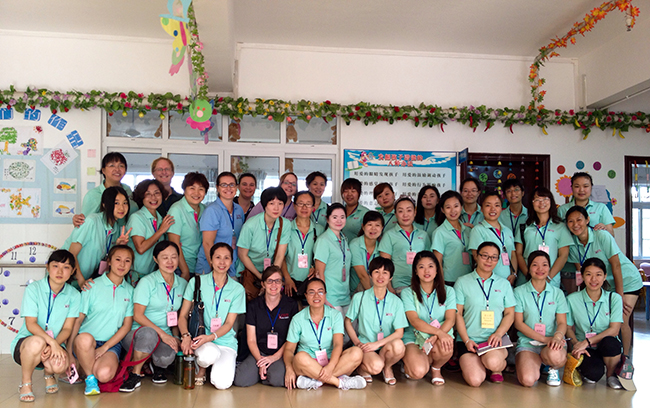Psychology professor brings expertise to China, returns with global perspective
September 16, 2014
 Tracey Scherr is returning to her University of Wisconsin-Whitewater classroom with a wealth of new knowledge and experiences to share with her college students.
Tracey Scherr is returning to her University of Wisconsin-Whitewater classroom with a wealth of new knowledge and experiences to share with her college students.
Scherr, an associate professor of psychology, helped lead of a group of educators from the United States who traveled to southeast China to collaborate with and learn from people who teach there.
The team traveled to an orphanage school operated in a social welfare institute in Shaoguan, Guangdong Province, and met with Chinese colleagues to share what they know about working with the diverse needs of students.
"In most Chinese orphanages now, more than 90 percent of the children have special needs, so the teachers have to be able to work with children of a variety of ages and abilities," Scherr said.
The team provided workshops for five days at this location to teachers from orphanage schools in multiple provinces. Students joined the workshops in the afternoons.
The schools were launched by Love Without Boundaries, a nonprofit group that aims to help orphaned and impoverished children throughout China. It sponsors the education of more than 350 orphaned and rural children. It created "Believe in Me Schools," which are Montessori-inspired schools located inside orphanages. The schools serve children at risk of not attending school or receiving an education.
The nonprofit opened its first school in 2004 and today operates six schools. It also provides programs for tuition assistance, tutoring support, secondary and higher education, school nutrition, life skills and dental hygiene. Scherr, a licensed school psychologist, became involved with Love Without Boundaries two years ago and today serves as one of its education associate directors.
As she returns to her UW-Whitewater classroom, Scherr has fresh international research and service experiences to share.
 "Whether it's through pictures or stories - I can show students real-world examples of how culture affects psychology and vice versa," she said. "More and more, we're seeing international influence in school psychology. At UW-Whitewater, we're seeing students come from other countries, students who are bilingual, or students looking to work in other countries. These international experiences help me advise them better and I can show undergraduate students the benefit of a study abroad experience."
"Whether it's through pictures or stories - I can show students real-world examples of how culture affects psychology and vice versa," she said. "More and more, we're seeing international influence in school psychology. At UW-Whitewater, we're seeing students come from other countries, students who are bilingual, or students looking to work in other countries. These international experiences help me advise them better and I can show undergraduate students the benefit of a study abroad experience."
Her colleague Shen Zhang, an assistant professor of psychology, was one of four people who translated educational materials from English to Chinese so Scherr could share them with educators in China.
"My colleagues have been so supportive," Scherr said. "It's exciting when we can collaborate with organizations on a global level."
Scherr said the project involved the help of faculty members from the College of Letters and Sciences, the College of Education and Professional Studies, and the School of Graduate Studies and Continuing Education.
For Scherr, the international trip also had a deep, personal connection. Her daughter, who she adopted from a Chinese orphanage, received nutritional assistance from Love Without Boundaries -- critical support that that helped keep the young girl healthy.
"I wanted find a way to give back," she said.
Photo: Scherr, back row in lavender shirt, poses for a photo with participants from the teacher training workshops.
